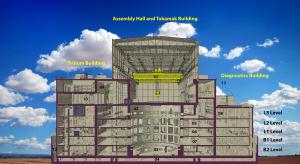Interior design
Fresh from the offices of the Design & Construction Integration Division, this cutaway drawing peels back the walls to reveal the interior layout of the Tokamak Complex.
This cutaway shows the Tokamak Complex as it is going up across from the ITER Headquarters building, with the Diagnostic Building on the right and the Tritium Building on the left.
One of the striking features that can be see when you enlarge the image is the number of small squares on the walls, floors and ceilings. Numbering in the tens of thousands, these are the embedded plates, positioned throughout the structure where equipment will need to be attached.
In the centre, the concrete bioshield forms a circular well where the ITER Tokamak will be assembled from bottom to top.
Once the Tokamak Building reaches the height of the Assembly Hall, the temporary wall between them will be removed and a large open space will be created for the back-and-forth of the travelling cranes as they deliver components for installation in the machine.
Match the numbers on the cutaway with the information below for more details on Tokamak Complex construction:
01 — The lifting system in the Tokamak/Assembly Hall is made up of a massive 1,500-tonne double overhead bridge crane and two 50-tonne auxiliary cranes. They were installed respectively in June and December 2016.
02 — Steel reinforcement is presently being installed at Level 3 of the bioshield. L3 will be the first level that will have more concrete than openings; L4 (the final level of the bioshield) will be an unbroken wall of concrete.
03 — At the bottom of the machine a steel-and-concrete "crown" will support the combined mass of the Tokamak and cryostat (23,000 tonnes). A mockup is under construction to demonstrate the full constructability of the structure (see related article).
04 — The huge mass of the Tokamak Complex rests on an arrangement of 493 columns, each topped by anti-seismic bearing. Separating the columns from the rest of the building is the B2 basemat, seen as a thick purple line under the cryostat crown.
05 — Gallery at upper port level.
06 — Gallery at equatorial port level.
07 — Gallery at lower port level.
08 — Work is evolving at L3 level in the Diagnostics Building (the final level). Teams are preparing to pour walls and columns.
09 — A 10-metre-high "vault" will accommodate the Tokamak's cooling water system (TCWS).
10 — TCWS vault annex.
11 — Work is evolving at L1 level in the Tritium Building.
12 — The interspace between the seismic pit and the Tokamak Complex building varies from 1.5 metres in the lower region to 2.5 metres in the upper region. In case of a seismic event, this interspace will accommodate the lateral displacement of the entire Complex, moving on its B2 basemat slab.
13 — Cables for the lightning protection system.


